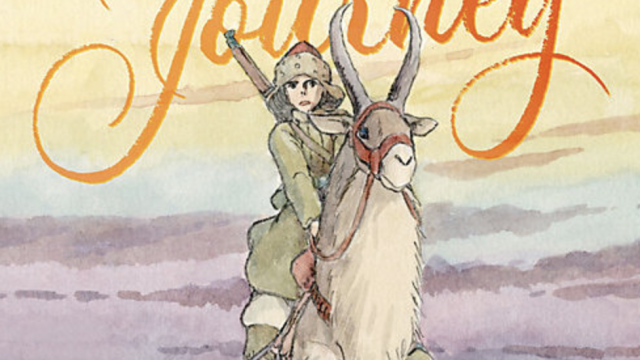Renowned animator and film director Hayao Miyazaki’s first standalone graphic novel, Shuna’s Journey, is receiving an American release via the Macmillan graphic novel imprint, First Second. Translator Alex Dudok de Wit describes the book as an homage to the traditional emonogatrari comics of late ‘40s and ‘50s Japan, rather than a contemporary manga.
Full of massive watercolor illustrations and minimally narrated through captions, Shuna’s Journey, originally published in 1983, shows visual and narrative themes emergent in some of Miyazaki’s later feature films. “Fans of Princess Mononoke and Nausicaä of the Valley of the Wind — there are millions of us — will delight in finding early hints of these masterworks in gorgeous watercolor pages by Miyazaki’s own hand,” Mark Siegel, editorial and creative director of First Second, said in a statement to press (via ABC News).
The story follows Prince Shuna as he attempts to find a solution to his kingdom’s barren lands. As he sets off, he meets a captive girl named Thea. After rescuing her and making enemies of her captors, he attempts to continue his journey west, hoping to find the golden grain that will bring prosperity to his people.
In a thread on social media De Wit explained that “[Shuna’s Journey] is based on a Tibetan folk tale, and the fantastical pseudo-Central Asian setting has a lot in common with the world of Nausicaä.” Miyazaki’s fascination with this landscape can be seen in one of his earliest published works–Sabaku no Tami (People of the Desert) — a serialized comic strip that ran from 1969-70 and also emulates the emonogatari style of comics.
The book isn’t so much a manga as an emonogatari (illustrated story), with all-watercolour images and text mostly presented as captions. It is based on a Tibetan folk tale, and the fantastical pseudo-Central Asian setting has a lot in common with the world of NAUSICAÄ. (2/4) pic.twitter.com/GswSObbDhe
— Alex Dudok de Wit (@dudeydok) February 22, 2022
The book, which de Wit describes as “[somber] and luminous,” will be released November 1. Miyazaki is one of the world’s most well-known animators, who, alongside Studio Ghibli, has won international acclaim for movies such as My Neighbour Totoro (1988), Howl’s Moving Castle (2004), and The Wind Rises (2013). Spirited Away, which remains the second-most commercially successful anime film of all time, won the Academy Award for Best Animated Feature in 2001.
